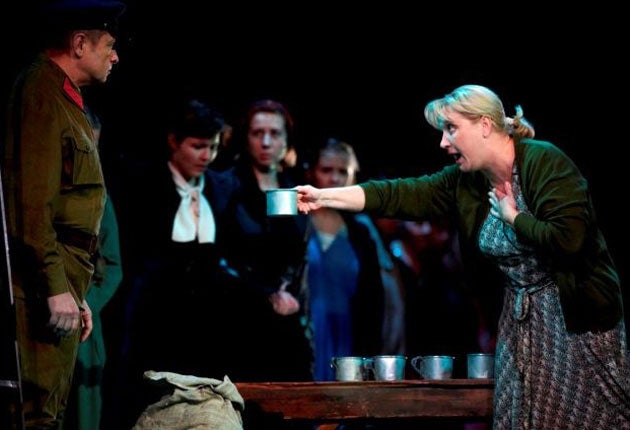Into the Whirlwind, Noël Coward Theatre, London
Expats flock for enduring home truths

The lengthy rehearsal periods customary in Russian theatre and the long, meticulously nurtured life of productions within the repertoire means that the ensemble work of its actors tends to boast a seasoned truthfulness that can make some of our own efforts in that department look like exercises in speed-dating. This was once again richly evident in Into the Whirlwind, a stage adaptation of Yevgenia Ginzburg's memoir of life inside a Soviet prison, performed by Moscow's renowned Sovremennik Theatre, making their London debut in a short, three-play residence bankrolled by Roman Abramovich.
The company was founded in 1956, during the Khrushchev "thaw", in protest against the lies and the paste-board heroes of the theatre of the day. It was in 1989, though, during the glasnost era, that Galina Volchek was finally able to give a theatrical platform to the Ginzburg memoir that had hitherto circulated illegally in samizdat form. Laying bare the tragedy of a nation through one woman's personal witness, the production released the floodgates of catharsis and has been playing to standing ovations ever since.
Any suspicion that Volchek's visceral staging might have become a bit mummified by now was decisively dispelled by the first of its two performances at the Noël Coward Theatre, where it was greeted with cheers and bouquets by a largely Russian audience. Presented on the stark mobile cage of Mikhail Frenkel's set, the production is intensely alive – qualities enhanced by the fact that you also get an extraordinary sense of its own history. For example, Marina Neelova originated the role of Ginzburg and has been portraying her for two decades. It doesn't matter that this short, stocky woman now looks too middle-aged. The actress's long-term dedication to the part seems to gives a further moral authority to her superbly stirring but unsentimental performance.
The play begins in 1937 when Ginzburg, a historian and loyal Communist party member, was thrown in prison on the trumped-up charge of Trotskyite counter-revolutionary terrorism. Her brutal interrogations by NKVD thugs (and even worse by a "sympathetic" psychological blackmailer) recur like a hideous refrain in some warped Kafka-esque ballad where hunger-strikes, reasoned arguments, and impassioned defences hurl themselves powerlessly against the iron bars of twisted, self-serving logic.
A huge, preponderantly female cast brilliantly capture the complex dynamics of prison life. We see how many of them clung to the belief that the false imprisonments and torture were a deviation perpetrated behind the guiltless Stalin's back. An inmate who has the nous to bracket Stalin with Hitler is roundly chastised for "comparing an asshole to a window". The often sharply funny fractiousness between the faithful and the sceptics, the moments of maternal anguish or devastation at having been duped into informing on friends: such moods are seamlessly interwoven here.
Unforgettable – it whets the appetite for Sovremennik's Three Sisters, which can be seen tonight, and its Cherry Orchard on Friday and Saturday.
Subscribe to Independent Premium to bookmark this article
Want to bookmark your favourite articles and stories to read or reference later? Start your Independent Premium subscription today.

Join our commenting forum
Join thought-provoking conversations, follow other Independent readers and see their replies